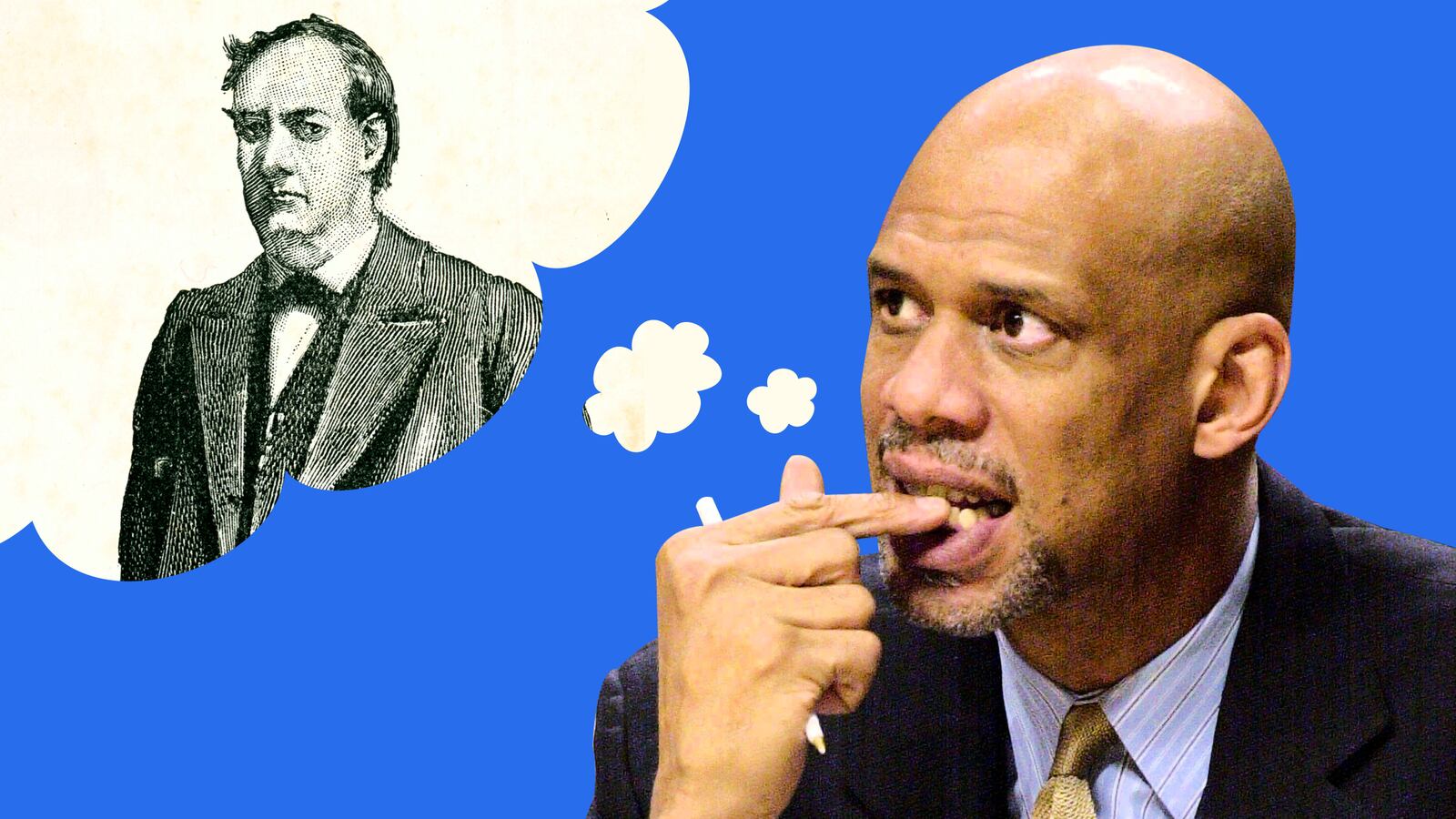The post-career careers of former basketball players vary wildly, from successful (think Magic Johnson) to jaw-dropping descents (think Allen Iverson).
For Kareem Abdul-Jabbar, the all-time leading scorer in NBA history known for his iconic skyhook, a literary second act was in store.
Kareem has been writing for decades now. He has written essays for Esquire, has a column at TIME, and has a pair of autobiographies. Now, he finds himself putting his creative reputation even further on the line with his first novel, Mycroft Holmes.
Co-written by Anna Waterhouse, it tells the story of Sherlock Holmes’s older brother, Mycroft, who works for the British government. While Mycroft has seen a surge in popularity (and screentime) lately on TV’s Sherlock and Guy Ritchie’s Sherlock Holmes, he is mentioned only a handful of times in the series.
Abdul-Jabbar’s book follows a young Mycroft (Sherlock is still in school) as he races to uncover a gruesome mystery—the draining of children’s blood in Trinidad.
In an interview with The Daily Beast, he opens up about why chose to write about Mycroft, the Black Lives Matter movement, and whether his record will ever be broken.
So you’ve written two autobiographies, children’s books, and have a column. Why did you want to write a novel now?
I probably have wanted to write a novel for a long time. I was a history major and an English major at UCLA, so I kind of let my talents go to the nonfiction side, because it’s all about facts and so it’s a lot simpler to write nonfiction. To write fiction you’ve got to have a great imagination and be a good storyteller. Most people have a problem with that. Or might have some questions about their own ability to tell stories. So for me, I think that’s it, me questioning myself kept me from taking a shot at it. Seems like I should have taken a shot at this earlier. It’s never too late.
So you’ve been a lifelong Sherlock Holmes fan, so why pick Mycroft, his brother, as the person you wanted to center it around?
I thought Mycroft, he’s mentioned in the original stories just a couple times, but Sherlock describes him as being very intelligent. His deductive powers are at least in equal in Sherlock. Sometimes he is the British government. And this is at a time when the British government is a world superpower. So it made for a very interesting possibility as to what he can do given his qualities. What he could do and how he would affect Sherlock and how he would affect the ruling of the British Empire. It left a huge area there to explore and define.
Why do you think the Sherlock Holmes series—there are movies, a television show—has lasted so long in our culture?
I just think the whole idea of crime and law enforcement—you want to get the facts right so you are able to identify and eliminate criminals, and not identify the wrong people. I don’t know if you’re familiar with the Innocence Project. They’ve found at least 300 convicted murders who oftentimes were identified by eye witnesses, they’ve been found not guilty by means of DNA. Unmistakably these people did not commit these crimes, yet they got convicted. And the people that thought that they saw them, weren’t lying. So, in order to get it right, to identify the criminals, and punish them to keep them from harming society, we have to be able to figure out who did what—and Holmes always gets it right. That’s something that any criminal justice system would go to great pains to do.
How did you decide which historical events you wanted to write about and why you centered it in Trinidad?
I know a lot about the culture of Trinidad because my family is from there. Trinidad was also very much a part of the British Empire. So in the book you have someone, Douglas, from Trinidad who tried to start a business in England, which is risky due to racial bias. Holmes, being the type of person he is, not a bigot, enjoys a friendship with someone that most people in England at that time wouldn’t associate with—“foreigners.” That was not always something that was socially acceptable.
Which brings up another thing I was thinking about while reading it. Douglas is, if you will, Mycroft’s John Watson. Your average white reader might not immediately think of a black man as being central to Holmes’s London. Was it important for you to have him be outside that space?
The British Empire at that point went around the world. The sun never set on the British Empire was a very accurate statement. So you had British subjects of all ethnicities. Europeans, Africans, West Indies, China, India, the Middle East. The British Empire included people of all ethnicities. I could have made him somebody of Indian descent and had the story interact with India. Given what I knew about the history of Trinidad, and the fact that it was a British colony made it all work.
How much research did you for the book. For instance, were you a cigar aficionado before writing this?
I was not always a cigar aficionado. But, both Holmes and his younger brother Sherlock were tobacco addicts. There’s no two ways about it. When you read the original stories, Holmes loved his tobacco and Mycroft loved his cigars.
Did you have to do much more historical research?
Well I knew a lot of the history going in, especially the stuff about Trinidad. Just because throughout my lifetime it’s always interested me because I have family there. It made it easy for me to bone up on the details and get them right. The trade between the West Indies and Great Britain was absolutely essential to Great Britain being a leading financial center. We have all these different elements that I think made for a great story. The craft of the story, however, would not be as excellent as it is without Anna’s skills.
When I told some people I was interviewing Kareem Abdul Jabbar about his new novel, they responded, “The basketball player?” They weren’t familiar with your writing. When you first started writing, did you face skepticism or prejudices because you’re more famous for your basketball career.
Yea, I think so. You know I was persistent, and very fortunate that people took me seriously and gave me a shot.
Were there other players in the league when you were playing that were similarly intellectually inclined like you?
Not that I know of. If there were, I didn’t meet them when I was playing.
At the time of this interview, there is a debate about to happen in L.A. Will you be watching?
I’m not a big fan of the Republicans, so I don’t pay a whole lot of attention to them. I got into a little beef with Mr. Trump the week before last. It wasn’t a big deal, but it was interesting.
What was the beef?
Let’s see, what’s the best way to say this…
I don’ think he would ask himself that question…
Right, I doubt he would. I just question how he could be the champion of the First Amendment when people are trying to ask him questions at his press conference and he dismissed the guy and had him thrown out of the room, the gentleman from Univision…
Jorge Ramos.
I thought that was really appalling. This is America. The press is free to ask questions. If you don’t want to answe, okay, you can say you don’t want to answer. But having somebody thrown out like that, that’s not what our political process should be about, and I made some statements about that.
So you’re not a big fan of the Republican Party. Have you been paying attention to the Democratic Party race?
Well I pay attention to all of it. it’s just that the Republican Party has gone through some major changes. When the party started it was about abolition and the preservation of the Union. It’s not about that now. It’s become a southern party for disgruntled people who don’t like immigrants. It’s really taken some dramatic changes. I don’t think it’s all been for the best.

So you wrote in a column last year more “white Americans believe in ghosts than believe in racism.” What do you make so far of the Black Lives Matter movement?
I absolutely understand their passion. When was the last time an unarmed white person was shot down in the street in New York City? I don’t think anybody can quote offhand a quick example. There have been, however, lots of people of color killed for no good reason. We’ve seen too much of it. The whole idea that blacks do not matter to a lot of people in this country—especially in law enforcement—there’s some veracity to it. When you look at the facts it’s not encouraging. So I think that the Black Lives Matter, the essence of what their issues are, are quite valid.
Do you think there will be a sequel for your book?
Well our publisher has asked for a sequel. We’ll see what that’s all about and try to come up with the next one. I’m pretty sure we’ll get a chance to do it.
I’d be remiss to ask. Do you think anybody will ever break your record for most points scored ever?
Well you know, they make so much money these days, that most of them will stop playing before they play for 20 years. It would take a long time to do that. It’s a challenge, and I feel it’s great that basketball players are challenged by that. I set the record, and somebody could break it, absolutely. It will be interesting to see if that happens, it’s why they keep statistics.






